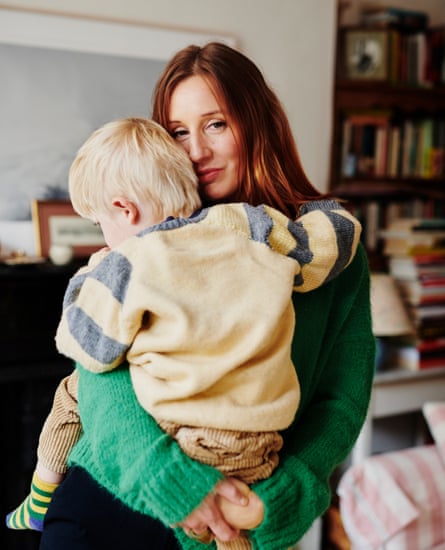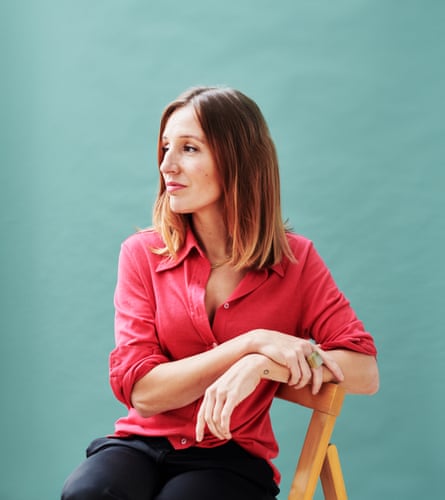‘I knew she was dying, but didn’t expect her to time it so spectacularly’: losing my mother as my baby was born

As I lay in the maternity ward, I learned my mother was gravely ill. What followed was a year full of love, rage, resentment – and a strange cocktail of new life and imminent death
At the top of my fridge is a small ceramic jar of stilton, and every time I open the door I can smell it. Recently, it’s started contaminating other food. This morning I binned some butter after it took on the same scent.
The stilton went off in July 2019 but I can’t bring myself to throw it away. It was a flat-warming gift from my mother, even though my boyfriend, Oscar, hates strong cheese and I was then six months pregnant, so unable to eat it. When she produced it from a calligraphed paper bag, wrapped in green tissue, we didn’t tell her this. Instead, we thanked her and put the cheese in the fridge. When we moved flats two years later, the cheese came with us.
The stilton had been a mistake, one of many she made before she died a year later. They began when she forgot to refrigerate the turkey at Christmas, and ended when she failed to register I was in labour. Both were symptomatic of an illness that was already fogging her mind, but because it’s easier to remember the bad things over the good – it makes the loss less gaping – now, every time I open my fridge and smell that cheese, I thank God she’s not here.
A week before I was due to give birth, I realised my mother was going to die. It was late May and she had rung me at the office, repeating what a doctor had just told her – that there was a “blockage” around her liver. The vindication in her voice was palpable after feeling “not quite right” for a while. I had been doing my pelvic floor exercises at my desk and took her call in the stairwell. Down the line, I could hear her sucking her teeth, which was the sound she made when she was scratching.
I had spoken to my mother every day since I left home aged 18. People were often surprised when I told them this, their raised eyebrows suggesting that a reasonable relationship with their own parents relied on more limited contact. But we were best friends and uncommonly close – the idea of going to bed without an update on her septic tank was unthinkable. On the day I found out I was having a boy, I actually felt disappointed because we wouldn’t be able to replicate the relationship.
But I also rang her to check she was still alive. My mother was young, even when she died, at 69, but she had been party to her fair share of ordinary disappointment. Her father died when she was a child and, by the time she was my age, she was divorced with two young daughters. When she was 50, her second husband died (I was 18). And by 60, she’d had a heart attack, calling me with brisk alacrity right after it happened, still sitting on the kitchen floor, holding a scourer (she had been cleaning the oven). For this reason, I spoke to her little and often.
The last time I had seen her was in late April, the week before Easter, in the West Country house where she, my sister and I had once lived. She looked thin, and I could tell she was secretly pleased about that. She had started to feel nauseous, first at night, then all the time, and would eat raw ginger after every meal. When she was out, she’d carry it foil-wrapped in her handbag and produce it like Canderel.
Then came the itching, which consumed the whole weekend. I spent that Good Friday rubbing aqueous cream over the small lines that spooled across her back at intervals, but by Monday I’d rubbed enough. My enormous belly was itchy too, but, I yelled – and I really did yell – because I was pregnant, I couldn’t use the creams.
Permanently on the lookout for a heart attack, we were blindsided when she woke up one morning in early June the colour of mustard. Her GP suspected a liver issue but, recalling her monthly whisky and soda, we all thought otherwise. Except he was right. Like most pernicious cancers, this one didn’t reveal itself until it was too late, dragging an anthology of nasty symptoms along with it. We actually never called it cancer – because of the tumour’s size and location, it wasn’t diagnosed until after she died – but like someone lost at sea, this always gave her illness an unwelcome lick of ambiguity.
In the days leading up to the birth, I grew rounder and happier, while my mother got thinner and sadder – the same person, just shrunk in the wash. I cooked soups for the freezer and swam in cold ponds, the baby heaving itself around as I entered the water. In bed, I read books about motherhood by Penelope Leach and, for balance, Rachel Cusk, studying their methods like syllabuses. I still rang her every day, but the calls got shorter. The last time we spoke before the birth, I was killing time at the zoo and we had a row, this time about whether my sister would visit me in hospital, or stay with her. She won.
I always knew I’d have a baby, but it wasn’t until I got together with Oscar that I actually wanted one. Then, one night, I cornered him in the shower of our old flat and gave him an ultimatum, even though (as he often reminds me) he felt the same way. To start, we played a sort of roulette, but nothing happened. Two weeks later, not pregnant and on holiday in Exmoor, I stood in a field and told him I was barren, actually using that word. By autumn, I was pregnant.
I went into labour on the first Saturday in June. It was one of those days when London pretends to be another city, windless and warm, and no one knows how to dress, so they simply don’t. I was woken at around 5am by my first contraction and immediately downloaded an app to time them. In between contractions, we ate toast, and Oscar bleached the kitchen. Afternoon became night, and night became morning. By Monday, 5.30am, still contracting every 12 minutes and unslept for 48 hours, I sat on the edge of my bed watching a thin ribbon of light come through our curtains. I deleted the app.
Finally, that evening, we were in a cab to the hospital, thunder clapping across the night, pain dancing across my belly. The baby had become lodged on my pubic bone, so the following day, at 9cm, I started to push him out. This was when I got scared. But just as his head began to emerge, I was told we had to push him back up using a foetal pillow, a recent invention that is supposed to make the whole process less traumatic. There was a slim chance the baby had haemophilia so we couldn’t use forceps. There is nothing poetic about an emergency C-section – he was ejected like a cassette – and I was too wobbly to hold him. The whole thing took 60 hours, and I thought of my mother once, at 8cm, when apparently I called out for her.
My sister was electric on text throughout, but I didn’t hear a peep from my mother. The weekend I went into labour, she began deteriorating at speed. I found out later that my sister (herself seven months pregnant) had driven to her house to scoop her up off the bathroom floor and take her to hospital. I also found out later that on the day I was to be discharged from the maternity ward, she was moved to intensive care. I had been too spooked to ring the hospital, but when I finally did, from the labour ward, the nurse answered her phone. There had been extensive internal bleeding, she said plainly, as if giving me directions. I handed the phone to Oscar and felt myself lurch forward. The baby shifted in its plastic box, turning towards my voice.
Back home, in bed with him, that first day was unique in the way it always is: agony to ecstasy, compounded by a fast, private transformation. It was hot. Outside my window the elms had turned brown, and over the next two days I watched their bark come off in strips like banana peel while the baby foraged among the sheets for my nipples. I found the connection I shared with him so astonishing, I didn’t think it could possibly last. Four days after the birth, my sister rang and told me to catch the next train. I was at that post-op stage where you approach peeing and stairs with similar trepidation, and took her call on the loo.

I knew my mother was dying, but I didn’t expect her to time it quite so spectacularly. The pram was still in its cellophane, so we took our as yet unnamed child to Bristol on the train, Oscar carrying him in a car seat while a steward pushed me in a wheelchair.
We arrived at Bristol Royal Infirmary just after 8pm. It was still light, the hospital was cool and empty. They let us on to the ward where a nurse pulled back my mother’s curtain like a compere.
Lying there, she looked small. The bleeding had stopped, but she had developed sepsis from a procedure to stem the flow of bilirubin and now virtually every organ was failing. Against all odds, she didn’t die that night, and for the next couple of days my sister and I took turns at her bedside, watching the monitor tracing a city skyline behind her. The baby, now one week old, stayed in the waiting room with his father. Every hour or so, Oscar would text that he was crying. I would sanitise my hands and my sister would quickly wheel me out. There, in between free coffee and grieving strangers, I learned to feed him. Sometimes, we changed him there too, fanning out 20-year-old magazines about ocean fishing across tables to make a mat.
I don’t know if the baby was hungry each time he cried, but I went anyway because it bought me time with my son and, quite neatly, time away from my mother. When she woke up, things became more complicated. She was afraid. She wanted us for longer stretches. We did what we could, moisturising her hands where the picc lines were inserted, washing her fringe and dabbing at her mouth with a wet swab while she pouted, looking – my sister, Oscar and I all independently noted – not unlike a baby.
In the waiting room, I usually got one breast emptied but rarely two before going back in, and often found myself in fist-biting horror detaching the baby’s mouth from a nipple using my finger so I could get back to her bedside. Sometimes he cried. Eventually he stopped. At least I think he did. The double doors of the ICU drowned out his cry.
Five more weeks passed. Twice she begged the doctors to let her die, and three times we were taken to a quiet room to listen to a consultant run through varying doomy diagnoses like a pinball machine. There are truths and then there is hearing them.
I wanted to be with my mother. But I wanted to be with my baby far more. Before long, I had begun willing her death on, like I was at the races. One morning, while walking my son around the garden, I rang my therapist to confess. “But of course,” she said. “You can only be mother to one baby at a time.”
My mother grew up in London but left when she was in her early 20s. She wanted fresh air and children, and moved steadily through the countryside west of London’s Olympia, where she was born, from Oxford to Wiltshire and finally to Somerset, where I grew up. My father left early. A single, working mother with dark hair and dark skin – her grandmother was Assamese – she sometimes confounded people. When she met my stepfather and his friends, she remembered someone calling her the “Indian princess”.
She was an art teacher, though really she wanted to be a mother who got to make art. Whenever friends came to stay, she’d sketch them while they watched television. The early departure of my father put paid to that. She returned to teaching. I was two and my sister was three. When my stepfather, Philip, a livestock haulage contractor, died in 2001, she left teaching to take over his business, learning to drive an articulated lorry to abattoirs and raising his sheep. I remember her getting furious when I told her she was a feminist. She only worked because she had to, she told me. She was an excellent teacher and devoted mother, but often pulled in different directions by both.
Over the first few months of what we imagined might be her recovery, life carried on: we managed to see Oscar’s grandmother and uncle before they died. We had moved into her house, but we were also able to return to our home in London for routine check-ups from healthcare workers and to name the baby. The health visitor’s questions were less about him and more about how I was coping. I simply was because I was.
READ RELATED: 5 Simple At-Home Exercises To Lose Belly Fat, Trainer Reveals
The trips were peaceful, like calendula on a burn. In our creaking flat, friends came over with bread and tomatoes, and things for the freezer. One cooked us pasta, which we ate using a pouffe as a table. Another brought us her mother’s frozen chicken soup, but by the time it had defrosted we had to rush back to Bristol.
One morning, back in the waiting room, we were approached by a well-meaning doctor who suggested we stop bringing the baby into the hospital, to lower the risk of spreading infections. It’s strange to imagine a world in which MRSA was the overriding concern, but from then on, I would express milk in the back of our hire car as we drove into hospital, and Oscar would feed him in parks and cafes around the city.
In late July 2019, my mother was transferred to a local hospital in Chippenham for a further seven weeks. Prolonged hospitalisation is bad: bone density plummets. Oscar, the baby and I would stay for the duration and, come September, swap over with my sister, who was due around that time. Once again, I would hand over the baby and as much breast milk as I could produce in the 25-minute car journey, and sit bedside for four or five hours.
The days dragged. I wheeled my mother from the ward to the common room to the canteen. Rooms were filled with puzzles, crucifixes, rudimentary physio equipment and incredibly kind nurses. They played Vera Lynn during teatime and a woman hollered for God every hour. My mother, not yet grey, was too young to be here, too sane. Finally, the weather picked up, so I got her into the garden where she sat in her wheelchair, picking at biscuits. No one wanted to be here, but I wanted to be with my baby. I wanted to be a new mother, bored out of my mind, drinking coffees in parks, empty hours to fill. When I sensed my mother could tell, I would go and sit on the loo and scream into my sleeve. When I suggested bringing him in – he was eight weeks old now, but she had not yet met him – she didn’t look at me. “Let’s see,” she said.
Mothers die, children are born. These sources of pain and joy are universal. Yet had I known the year would be like this, would I have had him? Probably not. Two years after she died, having my son is the best thing I’ve ever done, and while I’ve heard that the experience of having a second baby can be a corrective to the first, I doubt that’s true, or even possible.
One day, a little after visiting hours were over, I was in the bathroom on the ward, lowering my mother on to the commode. She always strung out my departure with errands (changing her water, refolding her pyjamas) but this was a new favourite. The bathroom window was open and we both heard a car pull up. The engine stopped, and I heard my son crying tinnily through the car window. My mother looked at me and whispered: “Don’t. Leave. Me.” His crying got louder. Then my phone started ringing. It was Oscar. As I stood up, my mother grabbed my hand with more force than she had in months, her eyes also welling up. I could feel my breasts tighten as the milk began to drop. The screaming picked up, and I looked down and watched two palm-sized patches of milk migrate across my T-shirt. Only then did she let go of my hand.
I didn’t realise just how angry I felt, just how jagged my pre-grief had become, until my mother’s burglar alarm went off one warm morning. There was no burglar, and the baby was asleep. Then, of course, he woke up. We punched in codes, but the alarm wouldn’t stop. In fact it seemed to grow louder. We called anyone who might know what to do, but they didn’t know. I turned the house upside down until, inexplicably, I landed on a baseball bat in the umbrella stand. I grabbed it and started swinging wildly at the alarm, beating it and large sections of the wall around it into rubble. The noise persisted, though, because burglar alarms don’t stop if you hit them with a bat. Eventually my screaming brought the neighbours round; I opened the door wearing a bra and boxer shorts. Eventually, we discovered the number for the alarm company on the side of the machine itself and that, after all these years, it worked. I later learned that mice had chewed through the wires, and I had missed the water pipes by two centimetres.
My therapist told me that grief tends to start at the diagnosis, but I’ve now learned that anger, like childbirth, keeps stranger hours. I was angry because I had wanted my mother, angry that this was happening now, but above all angry that the roles had been not just blurred, but reversed. Finally my mother agreed to meet her grandson, in the hospital garden. I’d never seen her hold a baby and I was struck by the ease with which she did it. He was nine weeks old. She held him four times in total. A few weeks later, she was discharged.
At the start, death was not simply on the cards, or on the table. It was all the cards, the whole table. Without a procedure called a Whipple, one of the longest and largest operations you can have since it removes your pancreas and part of your stomach, the already low survival rate of one to five years was virtually zero. They had more elegant ways of relaying this, but death was a fairly precise outcome; it was just a case of when.
Despite this, the operation always felt non-negotiable, and a week before Christmas, my sister and I drove her back into hospital. The roads were icy and empty at 5.30am. All being well, we would get a call at lunchtime, they said. We had coffee and toast and drove back home to wait. She would stay in hospital until January.
That season was uniquely hard, though there are worse places to be than a hospital, with its artificial trees and blitz spirit. But when I remember, that New Year’s Eve, fainting in the bathroom after a viscous liquid the colour of cut grass shot out of a tube connected to her stomach and spilled out on the floor, I’m still thick with shame.
Against the odds, my mother didn’t die this time, either. But once again she couldn’t eat solids, or move independently, so it was perhaps inevitable that once out of hospital, this would change her. Back home, gradually then suddenly, she became clinically depressed.
As my sister and I drew up another routine of care, my mother’s day took on a new routine: watching The Vicar of Dibley, shuffling around the house listening to Mark Knopfler’s theme from Local Hero on a loop for hours on end, and vomiting up her pureed meals. The song came out the year I was born and I tried to picture her heavily pregnant, drumming her fingers across her small Panasonic radio to ease the contractions, instead of a 69-year-old recalcitrant woman in cotton pyjamas.

We spent the early spring of 2020 trying to imagine her future while I nursed my son. She fantasised about Dignitas, though by this point, with coronavirus emerging, it was becoming clear that no one would be flying anywhere. We had no choice but to keep her alive, so instead, in between work shifts, Oscar and I drove to large green spaces – a monastery garden, an arboretum – and taught my mother how to walk. Circling an orchard, she cried as I timed her laps while the baby napped on a bench.
In desperation, we forced her to see an end-of-life therapist 20 years her senior, and woefully bad at his job. The last time we saw him, he’d let her out five minutes early, in the rain. Concerned she’d die either bankrupt or of boredom, we got home and wrote an email saying as much, and cancelled future sessions. Like that, the onus moved swiftly back to us. I pureed mangoes for my son and more for my mother, and they ate together at either end of the sofa, propped up on their pillows.
At the time, we had no idea what was happening, why she seemed to be getting sicker. The days had a rhythm, but at night things felt darker. I got drunk on my own – Oscar now back in London, not with flu, as we thought at the time, but Covid – scrolling through online support groups and firing off emails to the high-dependency unit nurses asking, then begging, for help. My son was seven months old, and awake every 45 minutes, so I began most days in a brittle state, though who’s to say whether it was tiredness or the hangover.
Weeks passed. No one replied to my emails. As the anxiety around Covid swelled, the gravity of what was happening felt strange and small to us. By late March, we handed over to my sister as part of our usual rotation, but I still called her every day. Then one day, in early June, my mother phoned me. The hospital had rung her with some test results.
In early March, most of her hepatology department had been signed off sick, so no one had received my emails from February. It turned out the surgeon had missed the tumour, and the operation had been unsuccessful. These things happen, of course, but for some reason, they had sent this news to Birmingham (where she had never been), yet neither hospital had contacted us until now. That day, I received three further calls in quick succession, mooting another operation, then chemo, then neither because she was inoperable. She would soon, it turned out, be dead. “I told you I was still ill,” she laughed down the phone. The next day, we celebrated my son’s first birthday with a square cake iced green and covered in small plastic horses. Then we drove back west, illegally, one last time.
It was odd to see the cafes and parks of Bristol, where we had spent so many months, empty. Inside the hospital, a cataclysmic reshuffling was well under way. Spaced seating and plexiglass, all staff and no patients. Like every consultant we’d met, this one danced around the diagnosis, but we pressed him on the details. We had already decided my mother would die at home (we had got this far without any care), but we wanted a picture of those final weeks: in what order would her organs give up, what would she sound like, how would we know. A year ago, when the doctors refused to let her die, the tension split the room. This time, she was getting what she wanted.
During the last few months of her life, there were two things that made my mother happy. One was spreadsheets. She drew up lists of furniture and shuffled behind us with a measuring tape as we walked around the house bickering about mirrors. The other was talking about taking her own life. The illness had transformed her, and I knew there was no point pretending otherwise. She wanted to take control, hurry things along, and became terrified that this would go on for ever. She ran through methods, and I explained the mess and how hard it would be to sell a house with blood on its walls. I listened, hoping this was not the same as advocating. Suicide, it turns out, is very, very hard to pull off successfully. (After she died, we found goodbye notes hidden around the house, which I still have in a drawer.)
Finally, finally, we got some help. Over the next month, palliative care and district nurses came and went. We never saw their faces behind the PPE, but would peek out of the window as they got changed in the car. Solids stopped, juice became water, sipping moved to straws. We used the baby monitor to listen to her breathing upstairs. We sat with her and talked about the heat, the dog, the garden. On more jaundiced days, we told her she looked like one of the Simpsons.
During those final weeks, we felt calm. Waiting for someone to die is bizarre, a little like Christmas (knowing it will come, not knowing how it will pan out). Still, nothing prepares you, even a year of knowing, so we distracted ourselves. Thankfully, WFH allowed our partners to be around, and my sister and I took our sons to the local weir to swim. It was July, lockdown had lifted a little, and the countryside opened up again. The west was blooming. Once, my mother’s room became invaded by wasps. They circled her bed, strangely beautiful, which gave an already dramatic tableau a strangely divine hue. Bound by this strange, anticipatory grief, things felt bittersweet.
Trying to eke out my compassionate leave, I was still working part-time. I remember putting my son down in the room next door and lying on my mother’s bed to write an article about shoes. As I typed with my left hand, I patted her hand with my right. She didn’t react. I stopped and checked her pulse, reflexively, but could see her breath rising weakly under the sheet. Lying down with my back to her, I pulled her body towards me so that we lay there, spooning, like she would do when I was sick. I told her the world was unrecognisable, how she’d hate it. I don’t know if she heard me. Somehow I finished the article and – I don’t exactly know why – took a photo of her. Sometimes, while scrolling through photos on my phone, I land on the shot and it shocks me like a nude.
The last conversation – something informed by what you think you should say – weighed on me. Technically there was time, but, given my mother was heavily sedated, I had to manage my expectations. Then, in early August, about two weeks before the end, I was in her room, when I saw her eyes open. I sat on the bed and asked her why she was leaving me now, when I needed her. “I’m so proud of you, Wenna. You’ll be fine,” she told me. I wanted to thank her, to reciprocate, to say I’m sorry for being so angry with you, but I didn’t. I was sorry, but I was also angry. The woman lying in the bed wasn’t her, just as the sick woman in various wards wasn’t either. We never spoke again. Two weeks later, as my sister and I were folding towels in her room, we heard her breathe in sharply, and grimace. We told her that it was time to go, and that we were OK. Our babies napped in the room next door. Then we watched her die.
After the funeral, held at a crematorium in Bath and attended by 12 masked guests, I returned to London. On the way home, I read about – bear with me – the animist conception of the world, the power and energy that exists in nature and even in human objects, the idea that we project one another on to these things. How objects, however practical, can become shorthand for love, and how easy they are to lose. I forgot about it until one day, while jogging around the park in my mother’s old puffer, I found one of her tortoiseshell hair clips with a few strands of hair in it. Terrified I’d drop it, I ran straight home, put it in a drawer. I suspect I kept the stilton for similar reasons. How is it possible to feel homesick for a person?
I remember one night at my mother’s house when the baby, then seven months old, would not stop crying. Outside in the corridor, I heard a noise, and there was my mother, having pulled herself up the stairs on all fours, now slowly limping across the carpet. It was just midnight. She came into the room and sat on the floor and, for a full 45 minutes, rocked his cot until he fell asleep. Without a word, she limped back down the corridor and back to her room. It only happened once, but it was a glimpse into how things could have been.
Source: Health & wellbeing | The Guardian







